De Nederlandse dichter, schrijver en beeldend kunstenaar Jan Wolkers werd geboren in Oegstgeest op 26 oktober 1925. Zie ook alle tags voor Jan Wolkers op dit blog.
Uit: Dagboek 1970
“VRIJDAG 2 JANUARI 1970
Een halve celestone.
Om negen uur op met het bevrijdende gevoel dat we weer met zijn drieën zijn. Kachel opgerakeld, thee gezet. Dan gaat Jeroen zijn kamerdeur open en zien we zijn slaperige hoofd. Thee met cake naast dat hoofd op de grond en het is weer even rustig. Het vriesweer is voorbij.
Het is vochtig. Ik had het vannacht al horen regenen op het dak. Ik zet, op verzoek van Jeroen, de eerste plaat van Fats Waller op. ‘Ain’t Misbehavin”. Voor de katten een blik haring in tomatensaus uit de supermarkt opengemaakt dat kennelijk al jaren oud is. De inhoud ziet eruit als een slijmerig beschimmelde sok in baksteengruis. Na het koffie drinken en het hapje groene kool met fricandeau gaan we rondrijden.
Het is voorjaarsachtig zacht. We gaan de Waddenkant langs. Bij de schorren staan duizenden scholeksters allemaal dezelfde kant op. Indrukwekkend. We kijken er lang naar door de kijker. Even voor Oost zien we een wulp vliegen. Heilige ibis van het noorden. Op de Waddenzee eilanden van ijs waar honderden vogels op zitten. Meeuwen en eenden. We doen even boodschappen in Den Burg. Zie verschrikkelijk lekkere donkere meid met brede dijen onder minirok. Ik zou wel met één duik van mijn kop onder die rok mijn tong willen doorhalen. Kopen vis (tong nota bene) en rum. Rijden via Oudeschild verder langs de Waddenkant. Dan gaan we naar Den Hoorn. Stoppen bij de kerk en lopen over het kerkhof. Drijver ligt er begraven. De kerk is uit 1646. Ik zeg tegen Jeroen dat hij vier jaar na ‘De Nachtwacht’ is gebouwd en Karina zegt twee jaar voor het Verdrag van Münster. Het einde van de Tachtigjarige Oorlog. Bij de Mokbaai ligt er gewoon een vrouw aan de kant van de weg met een rood-wit gestreepte ijsmuts op naar de lucht te kijken. Bij De Koog lopen we even naar zee. Er liggen verbruikte rotjes en vuurpijlen op het strand.
Thuis thee met rum. Jeroen en Karina spelen uit het Teleac- schaakboek de wedstrijd tussen Euwe en Aljechin na uit 1934 in Zürich.
(Kende de naam Aljechin van Wim de Kler uit 1942. Zijn broer, die op de hertog van Windsor leek, schaakte.) Wit won gemakkelijk door zijn pluspion,’ herhaalt Jeroen steeds. Dat is gewoon te gek. ‘Hulde aan het loperpaar.’ Het klinkt echt een beetje lullig. Tak!!”
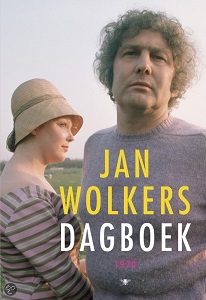
Jan Wolkers (26 oktober 1925 – 19 oktober 2007)
Cover
De Nederlandse schrijfster en journaliste Marja Pruis werd geboren in Amsterdam op 26 oktober 1959. Zie ook alle tags voor Marja Pruis op dit blog.
Uit: Wandelaar en zwartziener Het debuut van Martinus Nijhoff
“Feit is dat dat Nijhoff een klassiek dichter werd door zijn regels, en niet door zijn bedoelingen, zoals Gerrit Komrij opmerkte in een lezing over Nijhoff als erflater van de twintigste eeuw, in 1989. Feit is echter ook dat de spanning tussen het desolate van ‘De wandelaar’ en het zachte van ‘Het licht’, als je daar eenmaal oog voor hebt, ieder vers afzonderlijk in de bundel zijn dynamiek geeft. In de wisselende gedaantes van danser, clown, troubadour en alchemist wordt telkens een conflict opgevoerd tussen daadkracht en dadenloosheid, muziek en stilte, bloei en ondergang, soms binnen een enkele strofe: ‘Ieder mensch is een hovenier,/ Ieder mensch is een graver:/ En zacht en diep graven we hier/ Een kuil voor ons cadaver.’ (‘De tuinman’).
Met De wandelaar bracht Martinus Nijhoff onder woorden dat poëzie eerder beperkt is dan almachtig, maar wel bestaat bij gratie van die almacht. Een moderne opvatting die, strak en in heldere taal getoonzet, klassieke gedichten voortbracht. Nijhoff wordt nog steeds gelezen, ook door nieuwe wandelaars. Zo klinkt bijvoorbeeld in ‘Ik wil wel’ van de 26-jarige Remco Campert (uit de bundel Met man en muis, 1955) een echo door van de jonge Nijhoff. Opnieuw modern – minder fatalistisch (‘Ik wil wel’) en meer ironisch (‘Daar staan mijn handen nu eenmaal naar’) – maar net zo beweeglijk tussen hemel en aarde: ‘hoe ik dichter ben/ bij de gratie van aardoppervlak/ hemelbodem ook/ wel genoemd.’ Lees maar.
Ik wil wel
Ik wil wel graven
naar poëzie, maar niet
te diep. Je weet
hoe ik dichter ben
bij de gratie van
aardoppervlak
hemelbodem ook
wel genoemd. Daar
staan mijn handen
nu eenmaal naar. Dus
wandelaar en zwartziener,
geen delver
maar werper
van stenen, laatste
en eerste. Scherend
over aarde, daar
nesten mij bouwend
als zwaluw.”

Marja Pruis (Amsterdam, 26 oktober 1959)
De Martinus Nijhoffbrug in Zaltbommel
De Engelse dichter, schrijver en biograaf Andrew Motion werd geboren op 26 oktober 1952 in Braintree in Essex. Zie ook alle tags voor Andrew Motion op dit blog.
Uit: Better life (Fragment)
I am Richard and I am perfectly able-bodied thank you
and also of perfectly sound mind. What can I do for you?
The chances are I know more than you about most things.
I landed on Gold Beach on D-Day then worked as a brewer.
It was a useful life. Defending the realm, than making beer.
Now I am waiting for my telephone to ring. It never does ring.
If you were looking this way you would see my right hand
stretching towards you with something I have to pass over.
When I open my fingers you must look at the gift carefully.
You may well not recognise it to start with although soon
you will see it is the very thing you can never do without.
Who are we talking about? My name is Peter and in one way
or another I was married to Steve for 57 years. Today I am alone.
The pain is very strong because nobody would miss me if I died.
It would affect nobody. I am Simon, aged 67. I am Liz, aged 82.
I am Helen, aged 72 and I do tatting and keep fit on Wednesdays.
I am Ali and I am a widow and I think if you don’t do anything
then God won’t do anything. This is Mehmet. And this here Geti.
I am Ron, and I enjoy a few boiled potatoes and a drop of broth.
I am not a lover of sweet things. I like simple bread and butter
and a bit of fish. My friend Rowena likes a slice of sponge cake.
Open the window and let me hear the geese flying across.
Can you hear what I am saying? Are you paying attention?
I love to hear the geese flying and know their ways home.
As for me, I was born in 1939 and all our people came down
from Staffordshire and Cheshire; I class myself a Traveller
not a Gypsy. When I was a boy we had a horse and wagon.
I had to make a fire and put the horses out to graze at dawn
then I had to bring them back close beside the wagon at dusk.
When dad bought a bus, which we called a freezer box, he sold
the horses. I stood and cried. I was a big lad. It was not the same.
You couldn’t smell the horses. Our people are in Magna Carta.
I had the life of Reilly. Now I have a serious illness and won’t last
but when I count my blessings at night I have a load of blessings.
I love God and want to die. What better thing is there to live for?
Is that you leaving now? Very well. As for me I have not done.
I am still the child that loves to arrive by night in a new place
then wakes early to pull the curtains back on sunlight pouring
into a bay I had never seen before where big pelts of seaweed
left to dry by the retreating tide and the dainty orange crabs
crawling across them and the pebbles are everything I need.
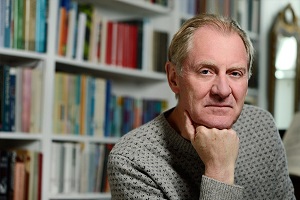
Andrew Motion (Braintree, 26 oktober 1952)
De Nederlandse schrijfster Maartje Wortel werd geboren in Eemnes op 26 oktober 1982. Zie ook alle tags voor Maartje Wortel op dit blog.
Uit: Goudvissen en beton
“Hij reed de stad binnen langs een moskee, een paar woonflats, een museum en het Wilhelminapark. Daar heeft hij zijn auto geparkeerd. In het park is hij op zijn rug in het gras gaan liggen om naar de boomtoppen te kijken en te luisteren naar het gefluit van de vogels. Hij dacht: hier hebben andere mensen gelegen en gelachen, gehuild, gevreeën, gedroomd, gedronken, gerookt, gesport, nagedacht. Hier zijn relaties verbroken of begonnen, eenden gevoerd, onuitgesproken woorden in dagboeken geschreven, mensen hebben hier elkaars had vastgepakt, geheimen gedeeld, bloemen geplukt, ze zijn hier gevallen, opgestaan, vreemdgegaan, ze hebben gras uit de grond getrokken, in de bosjes geplast, spullen verstopt, ze zijn hier geld kwijtgeraakt, ziek geweest, ze hebben op de grond gespuugd, gitaar gespeeld, gestampt, gedanst. Zij zijn hier geweest. Mijn vader wilde niet aan dit moment in de tijd voorbijgaan zoals hij tot nu toe aan zoveel dingen voorbij was gegaan. Hij herkende het en deed een belofte aan zichzelf: ik ga hier niet weg voordat ik al deze dingen gedaan heb.’
(…)
‘Ik dacht: hoe kan iets dat dood is toch verdriet hebben? Ik hoopte niet dat mijn moeder verdriet had. Dat leek me nou het enige positieve van de dood ten opzichte van het leven: je kwam voortaan onder al het verdriet uit. Om iets aardigs te horen kocht ik een pak fortune cookies. Op het eerste briefje dat ik las stond: ‘Dit wordt een jaar van voorspoed. /Cette année sera une année de prospérité. /Dieses Jahr wird ein gutes Jahr.’ Ik at alle koekjes op en las alle boodschappen; wat een dom idee was want niet alle voorspellingen konden tegelijkertijd waar zijn, al stond het er in drie talen. Als je moeder net dood is moet je normale koekjes eten.’
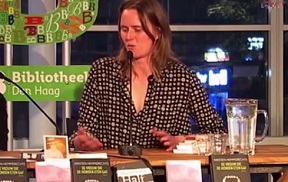
Maartje Wortel (Eemnes, 26 oktober 1982)
De Amerikaanse schrijver Stephen L. Carter werd geboren op 26 oktober 1954 in Washington, D.C. Zie ook alle tags voor Stephen L. Carter op dit blog en ook mijn blog van 26 oktober 2010.
Uit: The Emperor of Ocean Park
“And yet, amidst all the clamor, the Vineyard house is a small marvel. I loved it as a child and love it more now. Every room, every dark wooden stair, every window whispers its secret share of memories. As a child, I broke an ankle and a wrist in a fall from the gabled roof outside the master bedroom; now, more than thirty years after, I no longer recall why I thought it would be fun to climb there. Two summers later, as I wandered the house in post-midnight darkness, searching for a drink of water, an odd mewling sound dropped me into a crouch on the landing, whence, a week or so shy of my tenth birthday, I peered through the balustrade and thus caught my first stimulating glimpse of the primal mystery of the adult world. I saw my brother, Addison, four years older than I, tussling with our cousin Sally, a dark beauty of fifteen, on the threadbare burgundy sofa opposite the television down in the shadowy nook of the stairwell, neither of them quite fully dressed, although I was somehow unable to figure out precisely what articles of clothing were missing. My instinct was to flee. Instead, seized by a weirdly thrilling lethargy, I watched them roll about, their arms and legs intertwined in seemingly random postures–making out, we called it in those simpler days, a phrase pregnant with purposeful ambiguity, perhaps as a protection against the burden of specificity.
My own teen years, like my adulthood dreary and overlong, brought no similar adventures, least of all on the Vineyard; the highlight, I suppose, came near the end of our last summer sojourn as a full family, when I was about thirteen, and Mariah, a rather pudgy fifteen and angry at me for some smart-mouthed crack about her weight, borrowed a box of kitchen matches, then stole a Topps Willie Mays baseball card that I treasured and climbed the dangerous pull-down ladder to the attic, eight rickety wooden slats, most of them loose. When I caught up with her, my sister burned the card before my eyes as I wept helplessly, falling to my knees in the wretched afternoon heat of the dusty, low-ceilinged loft–the two of us already set in our lifelong pattern of animosity. That same summer, my sister Abigail, in those days still known as the baby, even though just a bit more than a year younger than I, made the local paper, the Vineyard Gazette, when she won something like eight different prizes at the county fair on a muggy August night by throwing darts at balloons and baseballs at milk bottles, and so solidified her position as the family’s only potential athlete–none of the rest of us dared try, for our parents always preached brains over brawn.”
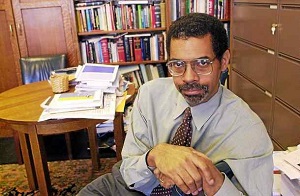
Stephen L. Carter (Washington, 26 oktober 1954)
De Zweedse dichteres en schrijfster Karin Maria Boye werd geboren op 26 oktober 1900 in Göteborg. Zie ook alle tags voor Karin Boye op dit blog en ook mijn blog van 26 oktober 2010.
Clouds
Look at the towering clouds, whose high distant cloudtops
proudly, shimmeringly rear up, white as white snow!
How calmly they glide forward, how calmly in the end to die
by soft dissolution into a shower of cool raindrops.
The majestic clouds – whether living or dying
they move forward smiling under the brilliance of the sun,
with no furrowing unease, in ether so openly clean,
they move with a stately, silent disdain for their undoing.
If only I too, with all that pomp of festivals,
might lift myself up to where the world’s bustle is gone
and no matter how furiously round me the storm howls on
might bear the gold garland of sunshine on my temples.
A Buddhist Fantasy
Unhasped is the world’s copper gate.
High in its gatevault, there I sat
and what I saw was infinitely vast;
there is nothing so infinite.
Searchingly and long I gazed.
My eye found not the least relief.
There what I knew did not exist;
not great, not small – not life, not death.
Just one step on that markless way
and all return for me is past.
Why are you trembling? Up, follow me!
For nature’s copper gate is forced!
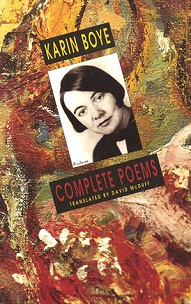
Karin Boye (26 oktober 1900 – 24 april 1941)
Cover
De Ierse dichter Trevor Joyce werd geboren op 26 oktober 1947 in Dublin. Zie ook alle tags voor Trevor Joyce op dit blog en ook mijn blog van 26 oktober 2010.
VERSES WITH A REFRAIN FROM A SOLICITOR’S LETTER (Fragment)
for George Hitching
As when a faded lock of woman’s hair shall cause a man to cut his throat in a bedroom at five o’clock in the morning; or when Albany resounds with legislation, but a little henpecked judge in a dusty office at Herkimer or Johnstown sadly writes across the page the word ‘unconstitutional’ – the glory of the Capitol has faded. — Benj. Paul Blood
Dear Sir, I was this morning straight
after the news and forecast
hanging from an old appletree in my garden
a small Japanese bell
when I received through the post your importunate
and quite misguided threats
and in this regard time shall be made of the essence
An injunction, you say. An obstruction,
you say. You’ve a lot of chat for someone
that’s not even clear who he’s talking to.
Does this help: not only have I
not erected any obstruction
in the form of a barbed wire fence or otherwise
and in this regard time shall be made of the essence
but I’m attempting today to rest and recover
from the effects of an obstruction in my own passages?
I have, it pains me to have to spit it out, a strangury,
and you’ve got the wrong man, chief,
I’ve better blockages to worry about
than the one at the back of some godforsaken hotel in Midleton
and in this regard time shall be made of the essence
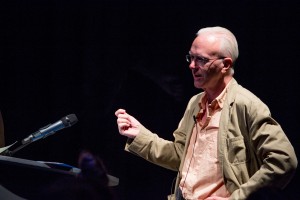
Trevor Joyce (Dublin, 26 oktober 1947)
De Amerikaanse schrijver Pat Conroy werd geboren op 26 oktober 1945 in Atlanta, Georgia. Zie ook alle tags voor Pat Conroy op dit blog en ook mijn blog van 26 oktober 2010.
Uit: My Reading Life
“Between the ages of six and nine, I was a native son of the marine bases of Cherry Point and Camp Lejeune in the eastern coastal regions of North Carolina. My father flew in squadrons of slant-winged Corsairs, which I still think of as the most beautiful warplanes that ever took to the sky. For a year Dad flew with the great Boston hitter and left fielder Ted Williams, and family lore has it that my mother and Mrs. Williams used to bathe my sister and me along with Ted Williams’s daughter. That still remains the most distinguished moment of my commonplace career as an athlete. I followed Ted Williams’s pursuit of greatness, reveling in my father’s insider knowledge that “Ted [has] the best reflexes of any marine pilot who ever flew Corsairs.” I read every book about baseball in the library of each base and town we entered, hoping for any information about “the Kid” or “the Splendid Splinter.” When the movie of The Great Santini came out starring Robert Duvall, Ted Williams told a sportswriter that he’d once flown with Santini. My whole writing career was affirmed with that single, transcendent moment.
The forests around Cherry Point and Camp Lejeune were vast to the imagination of a boy. Once I climbed an oak tree as high as I could go in Camp Lejeune, then watched a battalion of marines with their weapons locked and loaded slip in wordless silence beneath me as they approached enemy territory. When I built a bridge near “B” building in Cherry Point, I invited the comely Kathleen McCadden to witness my first crossing. I had painted my face like a Lumbee Indian and wielded a Cherokee tomahawk I had fashioned to earn a silver arrow point as a Cub Scout. My bridge collapsed in a heap around me and I fell into the middle of a shallow creek as poor Kathleen screamed with laughter on the bank.”
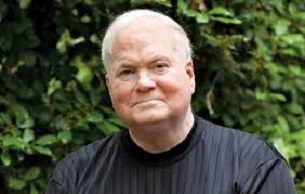
Pat Conroy (26 oktober 1945 – 4 maart 2016)
Zie voor nog meer schrijvers van de 26e oktober ook mijn blog van 26 oktober 2014 deel 2.
